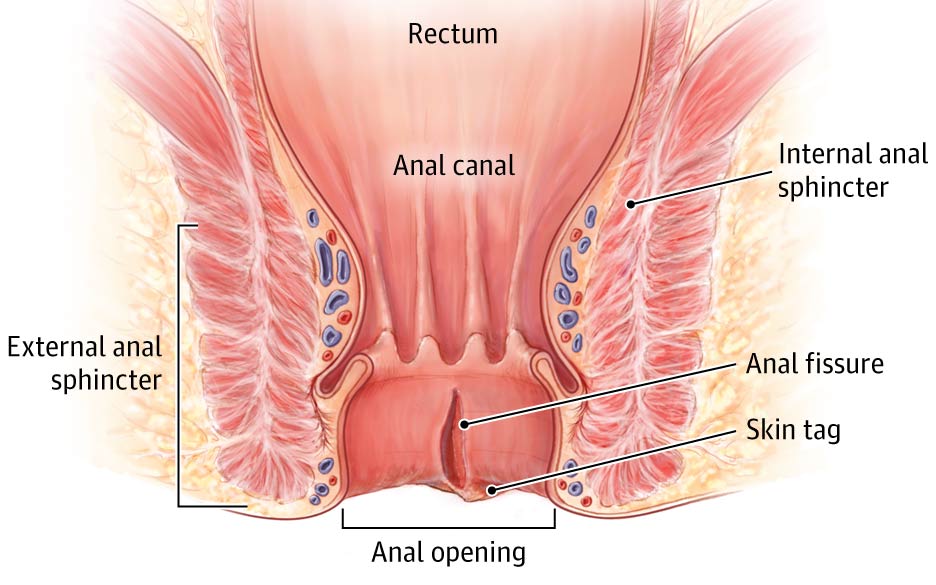
Fissure in Ano with Anal Spasm
An anal fissure is a small tear in the thin, moist tissue (mucosa) that lines the anus. An anal fissure may occur when you pass hard or large stools during a bowel movement. Anal fissures typically cause pain and bleeding with bowel movements. You also may experience spasms in the ring of muscle at the end of your anus (anal sphincter).
Anal fissures are very common in young infants but can affect people of any age. Most anal fissures get better with simple treatments, such as increased fiber intake or sitz baths. Some people with anal fissures may need medication or, occasionally, surgery.
Symptoms
Signs and symptoms of an anal fissure include:
Pain, sometimes severe, during bowel movements
Pain after bowel movements that can last up to several hours
Bright red blood on the stool or toilet paper after a bowel movement
Itching or irritation around the anus
A visible crack in the skin around the anus
A small lump or skin tag on the skin near the anal fissure
Causes
Common causes of anal fissure include:
Passing large or hard stools
Constipation and straining during bowel movements
Chronic diarrhea
Inflammation of the anorectal area, caused by Crohn's disease or another inflammatory bowel disease
Childbirth
Less common causes of anal fissures include:
Anal cancer
HIV
Tuberculosis
Syphilis
Herpes
Diagnosis
If possible, your doctor will perform a digital rectal exam, which involves inserting a gloved finger into your anal canal, or use a short, lighted tube (anoscope) to inspect your anal canal. However, if this is too painful for you, your doctor may be able to diagnose an anal fissure only by observation.
An acute anal fissure looks like a fresh tear, somewhat like a paper cut. A chronic anal fissure likely has the tear, as well as two separate lumps or tags of skin, one internal (sentinel pile) and one external (hypertrophied papilla).
The fissure's location offers clues about its cause. A fissure that occurs on the side of the anal opening, rather than the back or front, is more likely to be a sign of another disorder, such as Crohn's disease. Your doctor may recommend further testing if he or she thinks you have an underlying condition:
Flexible sigmoidoscopy. Your doctor will insert a thin, flexible tube with a tiny video into the bottom portion of your colon. This test may be done if you're younger than 50 and have no risk factors for intestinal diseases or colon cancer.
Colonoscopy. Your doctor will insert a flexible tube into your rectum to inspect the entire colon. This test may be done if you are older than age 50 or you have risk factors for colon cancer, signs of other conditions, or other symptoms such as abdominal pain or diarrhea.
Treatment
Anal fissures often heal within a few weeks if you take steps to keep your stool soft, such as increasing your intake of fiber and fluids. Soaking in warm water for 10 to 20 minutes several times a day, especially after bowel movements, can help relax the sphincter and promote healing.
If your symptoms persist, you'll likely need further treatment.
Nonsurgical treatments
Your doctor may recommend:
Externally applied nitroglycerin (Rectiv), to help increase blood flow to the fissure and promote healing and to help relax the anal sphincter. Nitroglycerin is generally considered the medical treatment of choice when other conservative measures fail. Side effects may include headache, which can be severe.
Topical anesthetic creams such as lidocaine hydrochloride (Xylocaine) may be helpful for pain relief.
Botulinum toxin type A (Botox) injection, to paralyze the anal sphincter muscle and relax spasms.
Blood pressure medications, such as oral nifedipine (Procardia) or diltiazem (Cardizem) can help relax the anal sphincter. These medications may be taken by mouth or applied externally and may be used when nitroglycerin is not effective or causes significant side effects.
Laser Surgery
If you have a chronic anal fissure that is resistant to other treatments, or if your symptoms are severe, your doctor may recommend surgery. Doctors usually perform a procedure called lateral laser internal sphincterotomy (LIS), which involves cutting a small portion of the anal sphincter muscle to reduce spasm and pain, and promote healing. Studies have found that for chronic fissure, surgery is much more effective than any medical treatment.